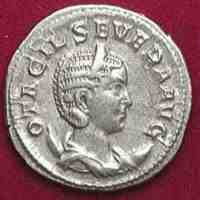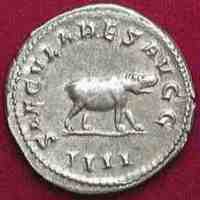
Otacilia Severa, wife
of Emperor
Philip I, "the Arab." Coin dated 247/248 AD image courtesy of Edgar
L. Owen,
|
CLA 228
Roman
Civilization
Spring 2009
|

games for Rome's
1000th birthday
and the new Saeculum,about 110 years in length image courtesy
of Edgar
L. Owen,
|
Instructor: Dr. Victor A. Leuci
Texts:
R. B. Kebric, Roman
People, 4th edition. Boston: McGraw Hill 2005 (Kebric)
C. Scarre, The Penguin
Historical Atlas of Ancient Rome, New York: Penguin 1995 (Scarre)
Jo-Ann Shelton, As the
Romans Did, 2nd edition. New York: Oxford Univ. Press 1998 (Shelton)
Links for materials to support this
course:
The syllabus also provides
links to various sites
Objectives: The
course
is a survey of ancient Roman life and thought. Our goals are to:
- establish a basic
understanding
of ancient Roman culture and daily life;
- understand how
everyday
life of
the different social classes was affected by politics, economics,
societal
norms, and the culture;
- appreciate the
literature and
art produced by Rome and its significance;
- understand the
evolution
of political
and religious systems in Roman history;
- understand how the
political,
economic, religious, cultural, and social aspects of ancient Rome were
related and integrated;
- appreciate how
ancient
Roman culture
is similar to and different from contemporary culture, providing roots
for much of our modern Western culture; and
- learn to reach and
defend positions
based on careful analysis of primary sources and thoughtful and
judicious
use of secondary sources (with an awareness of how and why the
secondary
sources agree and disagree).
Relationship to the General Education
Curriculum:
Roman Civilization 228 satisfies one of the two courses required within
the Historical Perspectives Context of Tier II. As stated in the course
objectives, Roman Civilization 228 provides students with opportunities
to immerse themselves in the ancient Roman culture and daily life,
learning
how it evolved politically, socially, culturally, and economically over
time. Mastering an understanding of a culture’s art, architecture,
literature,
philosophy, science, economics, politics, and religion offers
opportunities
for reflection on varying cultural, social, and historical traditions
including
work, family, voluntary associations, government. The course will also
foster an awareness of the role of values in decision making, search
for
meaning and identity, and the ethical issues of society. Much of this
will
be accomplished through the study of certain "archetypal" individuals
from
the time period covered. Students should also gain insight into ways
their
culture is similar to and different from the ancient Roman culture. It
is intended that students will acquire a deeper understanding of the
breadth
of our human experience and heritage over the expanse of Roman history.
Also intended is the understanding of the interrelationships of the
political,
social, artistic, cultural, intellectual, religious, and scientific
aspects
of life in ancient Rome. Finally, it is expected that students will
gain
a greater respect for other peoples and cultures because of their study
of ancient Roman civilization. Through this course, students will
develop
a propensity for historical methods of study that lead to an
understanding
of patterns and meaning in history. The teaching and use of historical
methods will be key for much of the above discussions, examinations,
and
analysis. It is expected that the students will be able to reach and
defend
their own positions based on careful analysis of primary sources
(keeping
in mind that many of our ‘primary’ sources for this time period are, in
fact, secondary to varying degrees) and thoughtful and judicious use of
secondary sources.
Format: The course
will
rely primarily on discussion with some lecture. We may also explore
certain
aspects of Roman life via the Web. Certain course information regarding
assignments will also be posted to the web page created for this course
and/or may be available via ANGEL. More
than
two unexcused absences will be considered excessive and will factor in
determining your overall grade. No make-up work will be accepted for
unexcused
absences.
Writing Intensive
Option:
Different types of writing will be part of the course: short papers and
exams that are predominately essay (two of which must be the take-home
versions). Six short papers will be assigned as a means to
help
participants come to a better understanding of important themes, ideas,
and concepts. The first short paper will be revised on the basis of a
conference
with me. Two other papers must be revised on the basis of
conferences
with me and with a tutor at the Writing Lab. A critique and conference
after the completion of a paper may also occur. In general,
participants
in the class should highly consider using the services of the Writing
Lab
and especially the Lab tutors, who can be of tremendous assistance.
Grading:
- Exams: 4
total (counting the final), 70 points
each. Your lowest exam score will be dropped (note that 1 of the 3
exams that will count must be an in-class exam)
- Papers: 6
total; 600-1000
words in length; 30 points each; your two lowest scores will be
dropped.
These papers may form an important part of class discussion.
- Class
Participation: 30
points; may also include posts in class discussion folder
Honor Code: All
students and faculty must adhere to the Honor Code; please see the
Student
Life Handbook for the full description of the Honor Code--p. 21
in
the Student Life Handbook gives a short definition: "No Westminster
student
shall commit any act of academic dishonesty in order to advance her or
his own academic performance, or to impede or advance the academic
progress
of others," but the sections on plagiarism and cheating are especially
important (see Honor Commission Constitution, Article IX).
ADA
Accommodation:
Any
student who feels that he or she may need an accommodation based on the
impact of a disability should contact me to arrange an appointment as
soon
as possible. At that time, we can discuss the course format,
anticipate
your needs, and explore possible accommodations. Westminster's ADA policy can be
found at the College's website (click
here)
Exams:
- In-class version:
The exams
will be a combination of fill-in the blank and/or matching (20 pts)
with one essay (50 pts).
The essay must
be
well written, at least four paragraphs long and replete with pertinent
facts
to support your thesis (or theses). The minimum length for an essay is 400
words. A
review
sheet will typically be linked to
the
web syllabus one week before the exam as an aid in your preparation.
One of your exams (that counts) must be an in-class exam.
- Take-home version:
You
may choose a take-home option on the exams. This will involve writing
either one 1200-1800 word essay or two 600-1000 word essays. The topics
for
these
essays will be provided along at the same time and places as the review
sheet for the in-class exam.
Papers:
Content:
Each
short paper
will focus on a specific question based on your readings or possibly on
a web site. The questions will typically be narrow in focus, and your
paper
should follow suite. The thesis you maintain in your paper should be
supported
with facts from the readings and from quotes where appropriate, both
the
facts and the quotes need citations. Wherever possible use ancient
Roman sources for your facts and quotes. The paper, however, should not
be
one long quotation.
- Formatting:
- Header:
start
with a simple
heading at the top of the page giving your name, course number, the
number
of the assignment (e.g. Paper #6), a word count, etc. (occasionally I
will ask you to include the prompt instead of a title for the paper)
- Citations:
again, you must cite both direct quotations and sources of information.
See pdf in ANGEL with examples for your aid; each paper topic may also
contain specific directions for citing.
- Spacing &
Font: you
may use any font, point size, or line spacing that you want--within
reason,
that is (though single spaced preferred as it saves paper).
- Submission: A
paper copy
is due at the beginning of the class period. An electronic copy of each
paper is also required and should be submitted within 24 hours of the
due
date for the paper copy; note that there is a two letter grade
deduction
for failure to submit an electronic copy.
Attendance:
Regular
attendance and participation are essential for the success of the whole
class. More than two unexcused absences will be considered
excessive,
and no make-up work will be accepted for unexcused absences. Each
unexcused
absence past two will result in a deduction of 5 points from the total
number of points one has at the end of the semester. If you are ill,
e-mail
me before class, if possible, or as soon as you are able.
Assignments:
The
assignments given below are not "set-in-stone," and may vary depending
on how each class period goes. The syllabus will be updated as needed.
Unit I: From Romulus
to the Rubicon (753-49 BC)
- Reading assignments (click
here for specific due dates):
- Kebric,
Chapters
1-3
- Scarre, pp.
12-15, 20-27, and 49 (map)
- Shelton, Chapters
I;
IV # 79-96
(pp. 59-71); VIII-IX; XV #402-404 (pp. 360-363), #412-428 (pp.
369-386),
and #455-459 (pp. 417-420)
Unit II: From Caesar to
Vespasian (49 BC - 69 AD)
Unit III: From Vespasian
to
Constantine (69 - 337 AD)
- Reading Assignments (click
here for specific due dates):
- Kebric, Chapters
6-9
- Scarre,
56, 60-61, 64-73, 88-127
- Shelton, Chapters
V, pp.
85-99, and XV, pp. 391-392 & 398-416
Unit IIII: Leisure and
Entertainment

